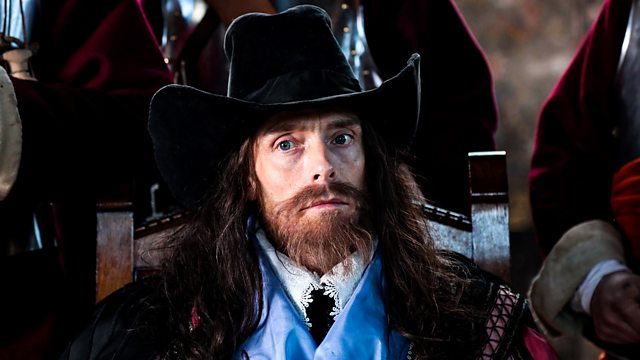
Episode 3
Charles I is found guilty of treason. Parliament races to get the king to the scaffold before foreign powers intervene and hurriedly passes an act preventing future succession.
On 23 January 1649, the third day of the king’s trial, Charles continues to publicly dispute the High Court’s legitimacy. There is no choice other than to move forward and enforce the charge against him. After two days of hearing witness testimonies concerning the king’s presence in battle, the evidence against him is overwhelming.
On 27 January, the king walks into the courtroom for the final time. He has come prepared to compromise, but it is too late for that now. John Bradshaw delivers an epic oration. He draws on constitutional history, including Magna Carta, and accuses the king of breaking his oath. Bradshaw states that the king was appointed by the people and it is the people who can remove him from power. ‘Farewell, sovereignty.'
Sentence is passed - Charles will be executed. Utterly beguiled, the king is removed from the courtroom, and over the next three days he prepares for death. Although the verdict has been delivered, Parliament’s cause is still fragile. Charles’s son, Prince Charles, is in The Hague mustering support for the crown. Invasion plans are already under way, and the clock is ticking, Parliament must get the king to the scaffold and put an end to the monarchy they believe has torn the country apart.
Despite the king’s strength, determination and vigour in the courtroom, he begins to accept his fate and spends most of his time in prayer. He says an emotional goodbye to his two children who remain in England, Elizabeth and Henry. Their likeness from this time is captured in an exquisite portrait miniature. Princess Elizabeth never recovered from the trauma of parting with her father. She records an account of their last, devastating moments together.
As the king gathers his affairs and his state of mind, the death warrant is hurriedly drawn up and signatories - some say under duress from Cromwell - are gathered. Cromwell’s determination comes from his belief that he is enacting God’s will and delivering justice for the people who suffered at the hands of the feckless King. His mind is set. The execution must be carried out.
On a freezing morning on Saturday 30 January 1649, Charles I wakes up at 5am and puts on two thick shirts to offer him some protection from the blistering cold. Determined not to appear afraid, he must not shiver. As the king prepares for death, Parliament are appalled to discover there is no act that prevents succession. In haste, they pass the act as a legal emergency.
Finally, shortly before 2pm, the king is led through Banqueting House. He may have looked up at the Rubens ceiling that depicts his father ascending to the side of God as is his divine right. He makes his way through a window and onto the scaffold to deliver his final speech to the people, now inked into the pages of history. Lying down at the low block, he says ‘Wait for the sign’ before he stretches his arms aside and his head is struck off.
People flock to the scaffold to dip their rags and kerchiefs in the blood of the king. Hair is cut from his severed head, to be preserved as relics, and the little pearl earring that delicately hung from his ear is carefully removed and remains preserved to this day.
On a freezing, bleak January day, King Charles I was killed and a republic was born. But did he die as a murderer or as a martyr?
Last on
More episodes
Previous
Next
You are at the last episode
Music Played
-
![]()
Luke Richards
Morning of the Attack
Broadcasts
- Thu 19 Dec 2019 21:00
- Christmas Eve 2019 02:50
- Wed 30 Sep 2020 22:00
- Tue 26 Jul 2022 22:00
- Mon 1 Aug 2022 02:15
- Wed 15 Jan 2025 00:35
- Wed 15 Jan 2025 02:35

